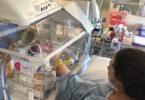Genetically modified human embryos are happening, and it’s not science fiction.
The human body is a mysterious, complex thing. Science understands a lot of what makes us work, but there’s still so much that is unknown. DNA, in particular, is a truly perplexing thing. We know so little about the cells that store our biological information, but scientists are ever on the lookout for new, more efficient ways to study the human body. That’s why the British have just given their scientists the “go ahead” to study the effects of genetic modification on human embryos.
According to the Human Fertilisation and Embryology Authority, doctors at The Francis Crick Institute are permitted to genetically modify human embryos in order to understand the genes that play a key role in human development and growth.
Why is this happening? Well, did you know that a fertilized egg can (and usually does) develop at an exponential rate? An egg can go from one cell to 250 cells in just 7 days. That is unparalleled growth, and understanding how this happens can have all sorts of potential benefits for the human race. If we can understand what causes the cells to multiply so quickly, imagine all the uses it could be put to:
- Re-growing amputated limbs
- Regenerating skin
- Re-vitalizing the body after cancer/treatments
- Restoring the health of bones, joints, muscles, connective tissues, organs, etc.
If scientists are able to determine what causes this exponential growth, it may help them to unlock new methods of treating the myriad diseases, illnesses, and genetic conditions plaguing the world today.
These applications are definitely a long way away, but even the immediate discoveries could benefit millions around the world. The research will help scientists to better understand embryo development, particularly in cases of In-Vitro Fertilization. The findings of these studies could also aid in the treatment and eradication of infertility.

READ MORE: False Positive Pregnancy Test: Can it Happen?
According to Paul Nurse, director of The Crick, “…the proposed research is important for understanding how a healthy human embryo develops and will enhance our understanding of IVF success rates, by looking at the very earliest stage of human development – one to seven days.”
Of course, the doctors are taking this permission VERY seriously. None of the genetically modified embryos will be implanted in women. All of the embryos used for the research are being donated, and they are ONLY to be used for research purposes–never for treatments. All of the women donating embryos have been informed of the use of their donation.
Things aren’t all “green lights” just yet. The program has been given clearance by the HEFA, but it still must receive ethical approval in order to commence. If the research can receive that approval, it will be able to start before late 2016. Concerns have been raised as to the purpose of this research. Many critics of genetic modification are claiming that the knowledge garnered through these studies may be used to “design” babies–as in creating the “ideal” baby by modifying their genetics. The United States has not chosen to approve genetic modifications to embryos, leaving the UK in a fairly unique position.
However, no one can truly predict what the future holds. Perhaps the results of this research can have far-reaching consequences leading to the betterment of the human race, or it will contribute to the decline of humanity as we “play God” more and more. Either way, it’s a fascinating step into the future just knowing that the possibility of genetically modified human embryos exists, and it’s a chance for us to further understand exactly how the marvelous, complex human body works.








